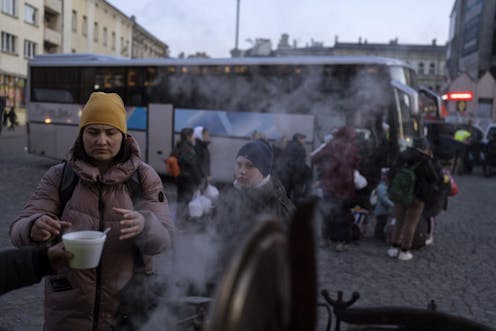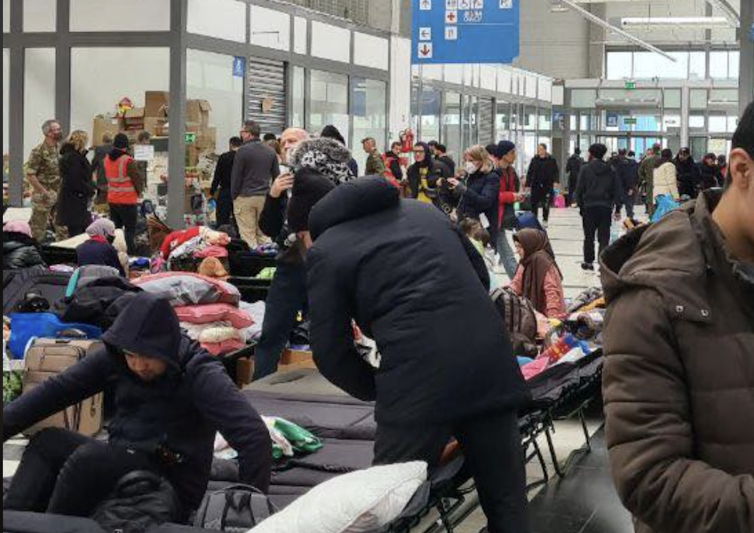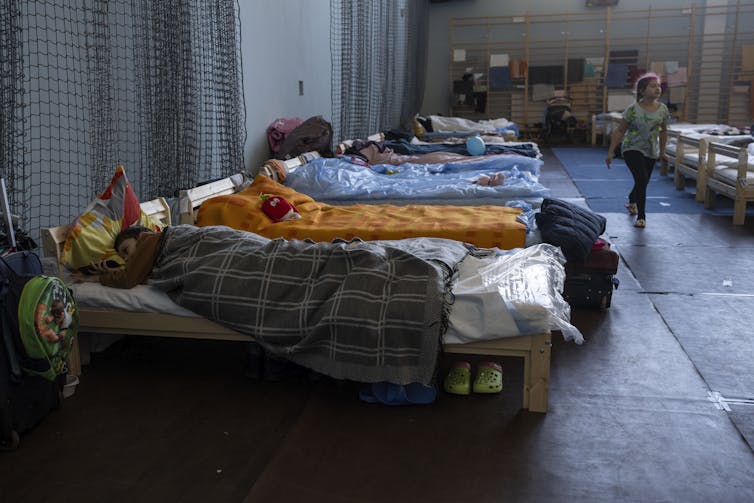
According to the United Nations, about 3.4 million people have fled Ukraine since Russia’s invasion. Of those fleeing, about two million have crossed the border into Poland.
While the initial flows of Ukrainian refugees were housed by the approximately one million Ukrainian diaspora in Poland — this is why the Polish government didn’t initially set up refugee camps — future flows of refugees will not have such familial or social ties and will require much more state and local support.
Reports from the ground say reception shelters are over capacity, and cities are saying they can’t take any more refugees.

For the last decade, Poland has been anti-immigrant and anti-refugee, and the ruling right-wing Law and Justice party was elected in 2015, at the peak of Europe’s migration crisis, on an anti-immigrant platform. So how is an anti-immigrant, anti-refugee government and society going to deal with millions of foreigners?
It’s going to get ugly — even for the white, “civilized,” “intelligent” and ideal Ukrainian refugees.
Read more: Ukraine: The good, bad and ideal refugees
Poland’s acceptance of millions of war refugees from Ukraine is commendable and should be praised but research shows that social divides that disappear during a crisis often re-emerge stronger after.
Poland’s undercurrent of xenophobia, mixed with concerns that refugees will greatly strain the Polish economy, is putting the country on a path towards negative attitudes about refugees.
A colder reception
Poland is accused of warmly welcoming white Ukrainian refugees, while refugees of colour are receiving a colder reception.
African, South Asian and Middle Eastern refugees were attacked earlier this month by Polish nationalists. Fake social media reports said violent crimes — like burglaries, assaults and rapes — are being committed by “economic migrants from the Middle East.” While the Polish government has quickly mounted a campaign to #StopFakeNews, disinformation is endangering the already precarious lives of refugees with darker skin.
To ensure that refugees from Ukraine are assisted no matter their nationality and race, Poland needs to confront its hostility towards foreigners. False narratives that refugees are “terrorists,” “criminals” and “security threats” needs to be stopped, not hijacked for political purposes or violence.
Acceptance of refugees can’t stop at the border — deeper reflection, social and political changes are required for the acceptance of foreigners into society.

A history of anti-refugee policies
According to the UNHCR in 2012, Poland only approved one per cent of asylum applications and was against the EU’s plan that would have seen 7,000 asylum seekers (mainly from Syria) resettled in Poland.
Part of Poland’s aversion to accepting refugees is because refugees particularly from the Middle East and North Africa are seen as a threat to its strong Catholic majority. The 2014 European Social Survey found that 34.3 per cent of Poles said that no Muslim should be allowed to come to Poland.
Dominik Tarczynski, a member of parliament for the Law and Justice party went viral in June 2018 for proudly telling BBC Channel 4’s Cathy Newman that Poland has admitted zero refugees during the Syrian Refugee Crisis, saying: “We will not receive even one Muslim because this is what we promised.” He received significant backlash but defended his country’s immigration policy by saying: “We don’t want Poland being taken over by Muslims, Buddhists, or someone else … and no one will ever force us to take Muslims, Buddhists, non-believers in huge numbers.”
And there are other drivers of anti-immigration sentiment in Poland such as fears over rapid social, cultural and political changes, economic fears that refugees will drain the states’ resources and security fears over concerns of crime and terrorism.
Poland and Belarus border issues
Last year, when Belarus began an aggressive campaign to destabilize the European Union by forcing mainly Middle Eastern and African asylum seekers and migrants to cross the Polish, Lithuanian and Latvian borders, Poland was under fire for Islamophobia, human rights violations and anti-immigration sentiments.
While this was largely depicted as the dictator of Belarus, Alexander Lukashenko’s weaponization of asylum seekers and migrants as pawns for political gain, Poland was criticized for its heavy-handed response, deploying 20,000 border police, who fired teargas and water cannons at asylum seekers. As of February 2022, at least 19 people have died at the border standoff.
As a result of Poland’s anti-immigrant sentiment and the still unresolved refugee crisis at the border of Belarus, many were surprised by the warm reception given to Ukrainians.
Given Poland’s long stance against immigrants and refugees, including xenophobic attitudes towards Ukrainian migrants following the military conflict in eastern Ukraine in 2014, maybe it won’t always be a warm welcome for Ukrainians.
Research on the sustainability of community support during a crisis has found that local kindness is often short-lived and social divides often re-emerge stronger after immediate danger has passed.
Yvonne Su does not work for, consult, own shares in or receive funding from any company or organisation that would benefit from this article, and has disclosed no relevant affiliations beyond their academic appointment.
This article was originally published on The Conversation. Read the original article.







